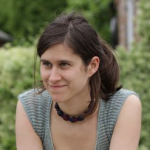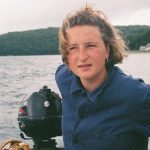
Start date:
September 2020
Research Topic:
Heritage and Public Space
Research Supervisor:
Professor Bella Dicks Dr Kate Moles
Primary funding source:
ESRC Studentship
I have an academic background in social anthropology (graduating from Queen’s University Belfast in 2013). Since returning to Wales, I have decided to explore my own society. This interest has been developed through my experience of working in Wales, particularly in the heritage sector and as a tour guide at the Senedd (Welsh Parliament). These experiences have informed my research interest in the intersection of public heritage/ museums, and their social value for contemporary society. This is particularly the case as heritage organisations are under increased pressure to demonstrate social value and contribute to social change in their work (Morse 2019, Chynoweth et al 2020, Brownson 2022). Also relevant are policy and popular media contexts of questions around heritage and public space, particularly regarding what should be done about (problematic) historical monuments (Burch-Brown 2022) and what their continued value might be to society today. Furthermore, I feel that it is important to acknowledge contexts of increased commercialisation of public space (Bodnar 2015, Smith 2018) in exploring the heritage value of public spaces.
My research is a case study of heritage values and practice at Cathays Park, Cardiff’s Civic Centre.. I have chosen Cathays Park because I aim to generate diverse data, for example working with stakeholders across organisations such as Cardiff Council, heritage organisations (national museums Wales), and charities (the Welsh Centre for International Affairs, based at the Temple of Peace and Health). Heritage values do not necessarily have a single definition (Pearson and Sullivan 1995) but can be understood as meanings and values that individuals or groups of people bestow on heritage, which is a significant factor in legitimising heritage management and protection (Diaz-Andreu 2017:2).
There has been a shift in recent decades away from an understanding of heritage value in terms of moving from a preservationist approach focused on physical conservation (for example of buildings), to one that rejects such a Western perspective, in favour of considering heritage significance from multiple perspectives. This involves for example bearing in mind the points of view of local or indigenous people and the meaning that they might attach to heritage, and the reasons why they may feel heritage to be significant (Duval 2019). This means that my research can be positioned within critical heritage studies, which focuses on heritage as a political, cultural and social phenomenon (Gentry and Smith 2019). I am interested to explore how heritage sector workers incorporate such approaches in their practice.
Heritage values are a prominent theme in heritage studies and museum studies literature across contexts in recent years (Stephenson 2008, Smith et al 2017, Pastor Perez et al 2021), with particular emphasis on social values and creating social impact (Scott 2016, Wearing et al 2021, Janes 2022). Social values can be understood as attachment of a collective to a place that embodies meanings and values that are important to a community or communities (Jones and Leech 2015). In this case, I am interested in heritage practitioners as a community working across contexts within one location and the meanings and values attached to Cathays Park as a heritage space.
Heritage organisations demonstrate social value and impact through work involving among other things social justice (Sandell 2012, Unsal 2019, Huhn 2021), decolonisation (Abungu 2019, Museums Association 2022), wellbeing (Brown 2019, French et al 2020) active citizenship (Fleming 2019, Turk et al 2022), identity (Preziosi and Farago 2019, Gilespie 2020) and commemorative or ‘memory’ work (Oztig 2022, Lloyd and Steele 2022). Thus heritage (buildings, objects) can be viewed to be valuable because of their potential contribution to this kind of work, which is seen to be valuable by communities. I am interested to see how this social value approach to heritage may be evident in the ways in which heritage professionals and other stakeholders at Cathays Park work, and how this is significant to Cathays Park as a specific heritage site.
I am particularly interested in cases of ‘inherited’ objects such as existing collections, buildings, or monuments at Cathays Park as a historical site, as opposed to a focus on for example acquiring new collections. This is because Cathays Park has been constructed from the start as a public space, with different generations contributing monuments, buildings or collections to the park over time (see Hilling 2016 for a social history of Cathays Park). This case study is informed by a relative lack of literature around heritage values in public spaces beyond museums and other official heritage organisations in Wales (for discussion of Welsh museums or heritage sites including work on identity and community see Dicks 1997, Mason 2007). I am interested in different approaches to heritage work which may be apparent at different public sites.
My research will likely consist of an ethnographic approach incorporating participant observation, photo-elicitation interviews, and autoethnography with visual methods such as photographs of the park, memorials, objects, buildings and heritage interpretation. I am also keen to use creative writing such as poetry as part of my methodology, most likely as a tool for reflexivity. Findings could include how heritage practitioners value the park as a site of memory and commemoration, a learning tool for social justice work, or as a space for promoting positive identity and wellbeing. I aim to shed light on the ways in which heritage professionals work across Cathays Park and how this could inform practice, for example in sharing learning across the site between different organisations. I also hope to demonstrate the heritage and social values of public space, including how they are important for different types of work such as addressing social justice issues or understanding identities.
During the first year of my PhD, I have got to know Cathays Park very well, including conducting a heritage audit for the Temple of Peace and Health, and attending commemorative events at Cathays Park. From January to April 2023, I will be completing an internship at Amgueddfa Cymru/ National Museums Wales, working in the research department around decolonising collections. I am also the editor of the ESRC DTP Methods blog, and I am a Welsh speaker.
Reference list
Abungu, G.O., 2019. Museums: geopolitics, decolonisation, globalisation and migration. Museum International, 71(1-2), pp.62-71.
Bodnar, J. 2015. Reclaiming public space. Urban Studies 52(12), pp. 2090–2104. doi: 10.1177/0042098015583626.
Brown, K., 2019. Museums and Local development: An introduction to museums, sustainability and well-being. Museum International, 71(3-4), pp.1-13.
Brownson, L., 2022. Diversity, equity, accessibility, and inclusion in Museums: edited by Johnetta Betsch Cole and Laura L. Lott, London, Rowman and Littlefield, 2019, 184 pp.,£ 65 (hardback), $37 (paperback), ISBN: 978-1538118634.
Burch‐Brown, J., 2022. Should slavery’s statues be preserved? On transitional justice and contested heritage. Journal of Applied Philosophy, 39(5), pp.807-824.
Chynoweth, A., Lynch, B., Petersen, K. and Smed, S., 2020. Museums and social change. Challenging the Unhelpful Museum, London and New York: Routledege.
Fleming, D., 2019. Global Trends in museums. Museum International, 71(1-2), pp.106-113.
French, J., Lunt, N. and Pearson, M. 2020. The MindLab Project. Local Museums Supporting Community Wellbeing Before and After UK Lockdown. Museum and Society 18(3), pp. 314–318. doi: 10.29311/mas.v18i3.3506.
Gentry, K. and Smith, L., 2019. Critical heritage studies and the legacies of the late-twentieth century heritage canon. International Journal of Heritage Studies, 25(11), pp.1148-1168.
Gillespie, H.E., 2020. Imperialism, Identity, and Image: Looking at Colonial Objects in English Museums. The Coalition of Master’s Scholars on Material Culture, September, 11, p.2.
Hilling, J.B. 2016. The history and architecture of Cardiff Civic Centre : black gold, white city. Cardiff: University Of Wales Press.
Huhn, A. and Anderson, A., 2021. Promoting Social Justice through Storytelling in Museums. Museum and Society, 19(3), pp.351-368.
Janes, R.R. 2022. The Value of Museums in Averting Societal Collapse. Curator: The Museum Journal 65(4). doi: 10.1111/cura.12503.
Jones, S and S Leech. 2015. Valuing the Historic Environment: A Critical Review of Existing Approaches to Social Value. London: AHRC.
Lloyd, J. and Steele, L., 2022. Place, memory, and justice: critical perspectives on sites of conscience. Space and Culture, 25(2), pp.144-160.
Morse, N., 2019. The social role of museums: From social inclusion to health and wellbeing. In Connecting museums (pp. 48-65). Routledge.
Museums Association 2022. Decolonising-museums – Campaigns. Available at: https://www.museumsassociation.org/campaigns/decolonising-museums/.
Oztig, L.I., 2022. Holocaust museums, Holocaust memorial culture, and individuals: a Constructivist perspective. Journal of Modern Jewish Studies, pp.1-22.
Pastor Pérez, A., Barreiro Martínez, D., Parga-Dans, E. and Alonso González, P., 2021. Democratising heritage values: A methodological review. Sustainability, 13(22), p.12492.
Pearson, Michael and Sharon Sullivan. 1995. Looking After Heritage Places: The Basics of Heritage Planning for Managers, Landowners and Administrators. Melbourne: Melbourne University Press
Preziosi, D. and Farago, C., 2019. General introduction: What are museums for?. In Grasping The World (pp. 1-10). Routledge.
Scott, C.A. 2016. Museums and Public Value. Routledge.
Smith, A. 2018. Paying for parks. Ticketed events and the commercialisation of public space. Leisure Studies 37(5), pp. 533–546. doi: 10.1080/02614367.2018.1497077.
Smith, G.S., Messenger, P.M. and Soderland, H.A., 2017. Heritage values in contemporary society. Routledge.
Stephenson, J. 2008. “The Cultural Values Model: An Integrated Approach to Values in Landscapes.” Landscape and Urban Planning 84 (2): 127–139
Turk, A., Tierney, S., Wong, G., Todd, J., Chatterjee, H.J. and Mahtani, K.R., 2022. Self-growth, wellbeing and volunteering-Implications for social prescribing: A qualitative study. SSM-Qualitative Research in Health, 2, p.100061.
Ünsal, D., 2019. Positioning museums politically for social justice. Museum Management and Curatorship, 34(6), pp.595-607.




























